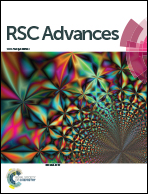Biodegradation of bisphenol A by the newly-isolated Enterobacter gergoviae strain BYK-7 enhanced using genetic manipulation
Abstract
Endogenous bacterial strains possessing a high bisphenol A (BPA)-tolerance/degradation activity were isolated from different outlets of petrochemical wastewater in Iran using the enrichment cultivation approach. Two bacterial isolates with high efficiency for BPA degradation in basal medium and petrochemical wastewater were identified as Enterobacter gergoviae strain BYK-7 and Klebsiella pneumoniae strain BYK-9 using morphology, 16s rDNA analysis and MALDI-TOF mass spectrometry systems. Due to the pathogenicity of K. pneumoniae, the E. gergoviae strain was selected for further studies. This strain with very high BPA tolerance (up to 2000 mg L−1) degraded 23.10 ± 0.126 mg L−1 BPA in basal medium, 31.35 ± 4.05 mg L−1 BPA in petrochemical wastewater and 53.50 ± 0.153 mg L−1 BPA in nutritious medium within 8, 72 and 48 h, respectively. Biostimulation by mineral salts and ethanol was effective in the BPA-degradation activity of the E. gergoviae. In addition, recombinant E. gergoviae [pBRbisd] was able to degrade 45.02 ± 0.334 mg L−1 BPA in basal medium within 48 h. These results point out this strain as a very promising organism for BPA removal in industrial wastewater.


 Please wait while we load your content...
Please wait while we load your content...